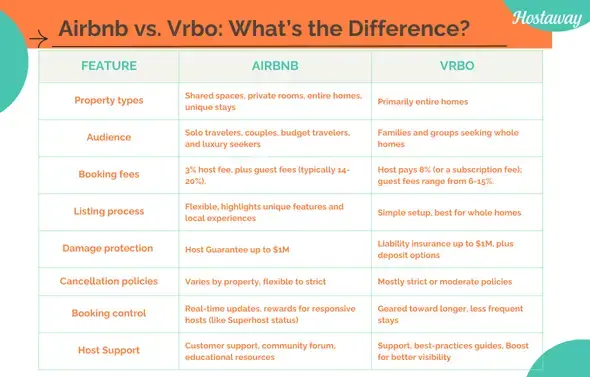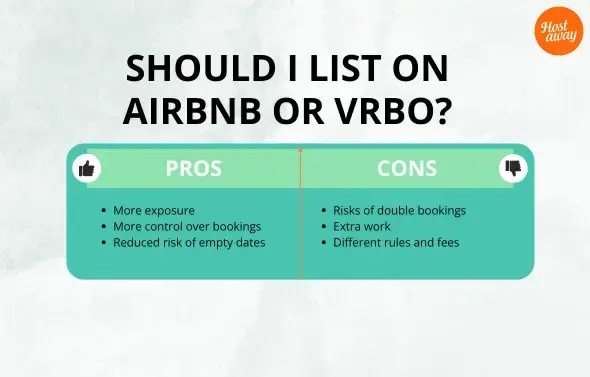Should I List on Airbnb and VRBO?
%20(1).webp?u=https%3A%2F%2Fimages.ctfassets.net%2Fpqmtoyw9z10u%2F3qbGOeFdaz1NWLU2RjeUoL%2F58ab7219f73141c0ec429c4e17377db4%2FShould_I_List_on_Airbnb_and_VRBO__1___1_.webp&a=w%3D960%26h%3D549%26fm%3Dwebp%26q%3D75&cd=2024-12-02T14%3A57%3A38.051Z)
Key Takeaways
Listing on Airbnb and Vrbo increases visibility and booking potential by reaching different traveler segments, from solo and urban travelers to families and groups.
Airbnb offers more flexibility in property types and attracts a broader audience, while Vrbo focuses on whole-home rentals and longer stays in vacation markets.
Each platform has different fee structures, cancellation policies and guest expectations, which directly impact pricing and profitability.
Listing on both platforms can reduce empty nights and stabilize income, but requires proper calendar syncing to avoid double bookings.
Using a channel manager makes multi-platform listing far more manageable and allows hosts to scale without added operational stress.
If you’re thinking about listing your house as a short-term rental on an OTA (Online Travel Agency), you've likely heard of Airbnb and Vrbo.
Both are industry giants dominating the vacation rental market and have become essential for short-term rental owners looking to attract a wide range of travelers to their vacation rentals.
Choosing the right platform for your short-term rental can maximize your revenue and help you attract the guests you’re aiming to host. But is it really worth listing on both?
As you navigate this decision, it’s important to weigh the pros and cons, understand what each platform offers and determine which aligns best with your vacation rental strategy.
Why List Your Vacation Rental on Major Platforms?
With millions of travelers hunting for short-term rentals on sites like Airbnb and Vrbo every day, using these OTAs can really boost your property’s visibility.
They simplify booking management, handle secure payments and even provide valuable insights into your visitors and your listing's performance. Plus, they take care of customer communication and offer support for any disputes that pop up.
Whether you’re offering just a room or a sprawling vacation home, these platforms handle the heavy lifting, so you can focus on providing a great stay for your visitors or perhaps consider expanding the vacation rental services you offer for an enhanced guest experience.
With the benefits of OTAs in mind, let’s take a closer look at the two major players in the industry and what they offer.
Overview of Airbnb and Vrbo
.webp?u=https%3A%2F%2Fimages.ctfassets.net%2Fpqmtoyw9z10u%2F47lLaJOi7pHh841vGveUd%2F3dab0457a3b31e6bc1eeae98cd0b7184%2FOverview_of_Airbnb_and_Vrbo__1_.webp&a=w%3D590%26h%3D337%26fm%3Dwebp%26q%3D75&cd=2024-12-02T14%3A44%3A22.307Z)
With its variety, Airbnb appeals to everyone from city explorers to adventure lovers. Today, Airbnb dominates the short-term rental industry with over 1.4 million Airbnb listings in the U.S. alone.
VRBO (short for “Vacation Rentals by Owner”) actually predates Airbnb, launching back in 1995. Unlike Airbnb, VRBO focuses solely on whole-home accommodations, which draws in families and groups looking for extra privacy and comfort.
Now a part of Expedia Group, VRBO has a strong presence in vacation-heavy spots and benefits from the wider reach of Expedia’s network.
Understanding their similarities and differences can help you choose the platform that best fits your rental property and hosting style.
Airbnb Vs. Vrbo: What’s the Difference?
While Airbnb and VRBO might look similar on the surface, they each have their own style, features and perks. Here’s a breakdown of what sets them apart:

Property types and vacation rental options
Airbnb casts a wide net, offering everything from shared rooms, private rooms, private apartments to entire homes and unique stays like treehouses. This variety attracts a broad audience looking for a range of experiences.
Vrbo, in contrast, focuses on whole-home rentals, including stand alone vacation homes, making it a go-to for families and groups wanting extra privacy.
Audience and reach
Airbnb’s reach extends to solo travelers, business travelers and couples, especially in urban areas and unique locations.
Meanwhile, Vrbo’s audience leans toward families and groups seeking a traditional vacation vibe, with listings often in popular getaway spots like beaches and mountains. Vrbo guests typically look for spacious accommodations that offer privacy and comfort.
With millions of listings, both platforms attract many travelers, each seeking different experiences based on their needs and preferences.
Booking fees and pricing models
Airbnb’s host fee is typically around 3% per booking, while guests pay an additional 14-16%. For hosts using property management software (PMS), Airbnb charges a “host-only” fee, generally around 14-16%.
Vrbo offers two pricing options: an 8% pay-per-booking fee, split into a 5% commission and a 3% payment processing fee, or a $699 annual subscription, which can be more cost-effective for highly booked properties.
Understanding the fee structure of each platform helps you plan pricing and expenses more effectively.
Listing process
Both platforms keep listing straightforward, but they emphasize different aspects. Airbnb’s listing setup allows hosts to showcase property photos, detailed amenities and even local experiences, which appeals to a diverse range of guests.
Vrbo’s process is equally simple, focusing more on whole-home rentals, ideal for hosts with larger accommodations or holiday homes.
Damage protection and insurance
Airbnb offers up to $1 million in damage coverage under its Host Guarantee program, providing a layer of security for hosts.
Vrbo also offers a Liability Insurance program of up to $1M for accommodation owners and property managers. This coverage includes protection against injury and property damage claims made by travelers.
Plus, Vrbo provides customizable damage insurance and security deposit options based on your property’s needs.
Cancellation policies
For cancellations, Airbnb offers flexible to strict options, from full refunds up to 24 hours before check-in to partial refunds 30-60 days in advance.
Vrbo’s policies are equally adaptable, ranging from relaxed (14-day notice) to no-refund, which is practical for vacation and long-term bookings.
Booking flexibility and control
Both platforms give hosts control over booking, pricing, and availability settings.
Airbnb offers real-time updates and rewards responsive hosts with perks like Superhost status and Guest Favorite tags, boosting interaction.
Vrbo is geared toward longer stays with fewer turnovers, perfect for hosts preferring steady bookings and less frequent guest turnover.
Host support and resources
For resources, Airbnb provides customer support, educational content and a community forum for advice sharing.
Vrbo complements its support with best-practice guides and the Boost program, allowing hosts to use credits to enhance visibility during peak times, which is valuable in seasonal and competitive markets.
Should I List on Airbnb or VRBO? Why not both?
Once you’ve chosen your platform — or decided to list on both — optimizing your listing is the next step to maximize visibility and bookings.
Here are some things to think about if you’re considering listing on both platforms:

Pros
More exposure: Listing your rental on both platforms can increase visibility and help fill your calendar faster, attracting a wide range of potential visitors from both platforms.
Reduced risk of empty dates: With listings on multiple platforms, you can reduce the risk of having empty dates, which can help stabilize your income.
Increased flexibility: Listing on both platforms allows you to test different pricing, policies and booking lengths, giving you greater control over your property’s success.
Cons
Double bookings: Managing different vacation rental platforms means you need to carefully track availability. Without tools like a vacation rental channel manager, you run the risk of accidentally booking on two major platforms for the same dates.
Extra work: You’ll need to manage messages, availability, pricing and guest communication across both platforms. Without the right tools, this can become time-consuming.
Different rules & fees: Each platform has its own rules, cancellation policies and fees. You may need to adapt your approach depending on which platform you’re using.
Optimizing Listings for Airbnb and Vrbo
To attract potential guests and boost bookings on both platforms, follow these tips:
Invest in great photos: Listings with high-quality images stand out in search results. Make sure your photos are clear, well-lit and show off your property’s best features.
Write detailed descriptions: Highlight unique features, whether you offer a single room, a private rental or a family-friendly house.
Set competitive pricing: Adjust your nightly rate to account for service fees, ensuring the total reservation cost remains appealing.
Maintain updated calendars: Accurate availability reduces the risk of confusion for guests.
Encourage positive reviews: Respond to inquiries quickly and deliver great guest experiences to build trust and increase visibility.
Direct Booking Sites vs. OTAs
.webp?u=https%3A%2F%2Fimages.ctfassets.net%2Fpqmtoyw9z10u%2F4v84LfUhguO7EW2b3B0m4k%2F3e1cf735ddd1721464677eedac73a5bb%2FDirect_Booking_Site__1_.webp&a=w%3D590%26h%3D337%26fm%3Dwebp%26q%3D75&cd=2024-12-02T14%3A50%3A44.046Z)
While OTAs offer lots of convenience, some hosts look into direct booking sites to avoid service fees.
A direct booking option can help you attract guests seeking the lowest total price and it gives you more control over your rental.
However, OTAs remain a favorite for their reach and user-friendly experience, especially when travelers compare private accommodations with traditional hotel rooms.
Making the Final Call: Airbnb, Vrbo or Both?
Choosing between Airbnb and Vrbo — or listing on both Vrbo and Airbnb — depends on your accommodation and hosting goals.
If you prioritize maximum reach, listing on multiple platforms is a smart strategy. On the other hand, if you prefer simplicity and better customer service, sticking to one vacation rental platform might suit you best.
No matter which platform you choose, focusing on guest experience, pricing and transparency will help you attract guests, keep calendars full and grow your hospitality business.
FAQS
1. Can I list the same property on both Airbnb and Vrbo?
Yes! You can list your accommodation on both platforms, just make sure to sync your calendars to avoid double bookings. Tools like iCal or Hostaway can help you with this.
2. Do I need separate insurance for Airbnb and Vrbo?
Both platforms offer liability protection, but you may need additional insurance depending on your property’s value and location.
Always check the policies and consider supplemental coverage if necessary.
3. How can I optimize my listings to attract more guests?
High-quality photos, clear and compelling descriptions, competitive nightly rates and prompt responses to guest inquiries are key.
Also, read reviews and respond to feedback to improve your listing’s visibility.
4. Are there regulatory considerations when listing on Airbnb or Vrbo?
Yes! Short-term rental regulations vary by location and they may impact your ability to rent your Airbnb home.
Make sure to check your local zoning laws, permit requirements and tax obligations before listing.
5. Can I set different pricing on Airbnb and Vrbo?
Yes, you can set unique pricing for each platform. For example, you might offer lower rates on Airbnb to attract budget-conscious travelers and higher rates on Vrbo to appeal to families and groups.
Ready to find out how Hostaway can transform your business?
